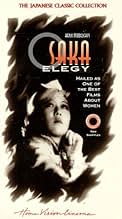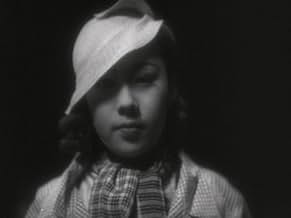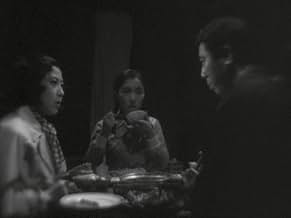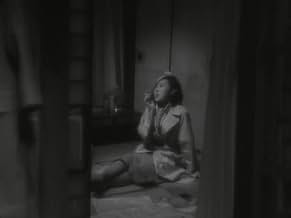IMDb RATING
7.2/10
2.8K
YOUR RATING
A young woman becomes a mistress of her boss in order to support her family.A young woman becomes a mistress of her boss in order to support her family.A young woman becomes a mistress of her boss in order to support her family.
7.22.7K
1
2
3
4
5
6
7
8
9
10
Featured reviews
An interesting look into 1930s urban mores...
...with a plot out of Precode Hollywood and frequent jazz music to match. A pretty young switchboard operator reluctantly decides to become the mistress of her boss so she can help her financially-strapped father who had embezzled company funds for an investment that went bad, and her college-student brother who needs his tuition paid. Of course she is ostracized from the family for her immorality without giving her the chance to explain how they got their money. Various other relationships and subplots also come into play. This one has nicely-plotted character dynamics, good performances, and beautiful cinematography.
Ayako becomes the mistress of her boss, Mr. Asai, so she can pay her father's debt, and prevent him from going to prison for embezzlement.
An exceptional film in that it redefines that cinematic, to a degree literary, trope, the femme-fatal. In this film we watch from her perspective. Her transgressions seem themselves a kind of victimization. Not only is sexuality the only tool a woman is given to empower herself in society, but her dignity and her sexuality are therefor put in an antagonistic relation to each other. Sexuality and sincerity become mutually exclusive in the world Mizoguchi paints. The cinematography is magnificent. Everyone looks compromised. But the last shot lets us know which victim's compromise cuts the deepest and. A feminist work in the most profound sense.
Amazing Cinematography
Ayako (Isuzu Yamada) becomes the mistress of her boss, Mr. Asai, so she can pay her father's debt, and prevent him from going to prison for embezzlement. She also sends money to her brother Hiroshi to pay his university tuition, but her father intercepts it.
Mizoguchi considered the film his first serious effort as a director, and while I am not familiar with his earlier work, I have to say this is the kind of film that leaves a mark. Either Mizoguchi or his cinematographer had an excellent awareness of the camera -- the door closing to block the camera early on in the film -- years ahead of its time.
The subject matter in general is impressive. I am not sure what the typical morality was in pre-war Japan, but to feature adultery and whatnot in the 1930s seems quite bold.
Mizoguchi considered the film his first serious effort as a director, and while I am not familiar with his earlier work, I have to say this is the kind of film that leaves a mark. Either Mizoguchi or his cinematographer had an excellent awareness of the camera -- the door closing to block the camera early on in the film -- years ahead of its time.
The subject matter in general is impressive. I am not sure what the typical morality was in pre-war Japan, but to feature adultery and whatnot in the 1930s seems quite bold.
10Gonzo-23
Lamentations of a poet
It was this film alone that drove me into an intense obsession with cinema. Mizoguchi is the great Japanese master, and Osaka Elegy reveals his genius. From his long take compositions that are taxed with complexity and tension, to his ambigious depictions of character, I felt like I had grown after I had seen this film. Notice the national allegory at the film's conclusion, a confused and lonely Japan. And his inconclusive final shot taken many years before the well known 400 Blows. The devastating melodrama is not undercut by any cinematic manipulation. I highly recommend this to any lover of the cinematic medium. Also, I am a sucker for self-reflexive Kabuki theater sequences...
A Good Japanese Pre-World War 2 Movie
This film begins with a relatively wealthy--but extremely grouchy--old man by the name of "Sonosuke Asai" (Benkei Shiganoya) harping on all those around him for very minor issues. It's during this time that his wife "Sumiko" (Yôko Umemura) sarcastically recommends that he gets himself a young mistress since he no longer finds her appealing. That being said, it just so happens that there is a young employee at his office named "Ayako Murai" (Isuzu Yamada) that he finds quite attractive and knowing that she is in desperate need of money due to a family matter offers her the unenviable position. In any case, faced with very little choice she reluctantly accepts his offer. Unfortunately, even though she tries to do what is best for her family, she soon discovers that she has lost the respect of everyone of any consequence to her. Now rather than reveal any more I will just say that I initially thought that this was a comedy as the first few scenes seemed rather light-hearted. But things change rather remarkably later on. On another note, it should be mentioned that silent films lasted a bit longer in Japan than most other industrialized nations and that this was one of the first pictures to utilize sound. Be that as it may, I thought that this was a pretty good movie and I have rated it accordingly. Above average.
Did you know
- Quotes
Junzo Murai: You're a woman... Being taken to the police station... Getting thrown into jail... You've done shameful things. You ungrateful child!
Ayako Murai: How could you say that? I never expected that I'd be treated like this when I came home. This is ridiculous! I thought you would welcome me with open arms. If I'd have known this, I never would have come back.
- ConnectionsFeatured in Century of Cinema: Nihon eiga no hyaku nen (1995)
- How long is Osaka Elegy?Powered by Alexa
Details
- Release date
- Country of origin
- Language
- Also known as
- Naniwa Elegy
- Production company
- See more company credits at IMDbPro
- Runtime
- 1h 30m(90 min)
- Color
- Sound mix
- Aspect ratio
- 1.37 : 1
Contribute to this page
Suggest an edit or add missing content


























